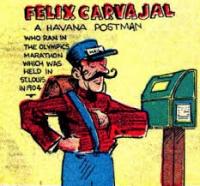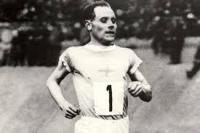1904, St. Louis, U.S.

Cuban postman Felix Carvajol provided humor showing up for the marathon in street clothes.

Thomas F. Kiely, winner of the all-around athletic championship.

American marathon runner Fred Lorz was the center of a scandal.
Editor’s note: As the 31st Games of the Olympiad approaches, August 5-21 in Rio de Janeiro, I thought it would be interesting to resurrect stories of former Olympics as written in Coconut Times in the summer of 1992, year of the Games in Barcelona, Spain.
Hoping to avoid a repeat of the failure of the second Olympiad in 1900, Baron de Coubertin, the President of the International Olympic Committee, was optimistic about the success of the third Olympiad, but it began with serious controversy over the site selection.
Chicago, St. Louis, and Buffalo were all battling for the privilege. It was also marked by scandal in the marathon race, when Gold medal winner, Fred Lorz was stripped of his medal.
Because of the superb performances of the American athletes in the first Olympics in Athens in 1896 and again in the second Olympic Games in Paris in 1900, Baron de Coubertin was anxious for the United States to be awarded the site for the third Olympic competition. Because of the Baron’s enthusiastic endorsement and the great interest shown by three American cities, the Olympic Committee met at the Auto Club de France in Paris, France, on Tuesday, May 22, 1901, and decided that the third Olympics would indeed be the first to take place in the United States. Thus the controversy over the site selection began.
Several cities put in bids for the 1904 Olympic Games. Buffalo wanted the Games to be held in conjunction with the Pan-American Exposition, but because the Exposition was to take place in 1905, which did not coincide with the four-year interval between Olympics, the Committee decided to award the site to Chicago. St. Louis, the other city in contention, failed to send a representative to the Paris meeting.
Although it was still more than three years before the actual event was to take place, a committee was formed to make preliminary plans. The committee, led by President Harper of the University of Chicago and Henry J. Furber, who was appointed chairman, submitted a set of plans for the third Olympics to the International Committee. These plans included using the University of Chicago grounds for the site of the games and the arrangement for $40,000 to underwrite the preliminary expenses. With these plans in place, in May of 1902, President Theodore Roosevelt was offered and accepted the honorary presidency of the 1904 Olympics.
As the officials representing Chicago continued with their plans, the promoters of the Louisiana Purchase Exposition, which was to be held in St. Louis in 1904, decided that the third Olympics should be held in conjunction with the Exposition. If it was not, the Exposition would hold a rival athletic event and offer large prizes to the athletes. Also supporting the moving of the site from Chicago to St. Louis was James E. Sullivan, the secretary of the Amateur Athletic Union. Because of all this opposition, the Chicago committee chairman, Henry Furber, felt that financial success would be impossible. This, coupled with President Roosevelt’s request to move the Games, was responsible for the International Committee’s fourteen to two vote to move the Games to St. Louis.
The third Olympiad took place in St. Louis and was stretched out to cover the period of the Exposition from May to October of 1904. Although 38 separate athletic events were scheduled with more than 9,000 athletes participating, only 11 of these events with the 1300 athletes competing had true Olympic significance. These events included:
Athletics 545 contestants
Rowing 131 “
Cycling 124 “
Tennis 92 “
Swimming 308 “
Fencing 42 “
Boxing 28 “
Wrestling 62 ‘
Lacrosse 33 “
Gymnastics 38 “
Archery 47 “
Most of the contestants were Americans. In track and field, the Americans won 21 of 22 events; the only non-American track and field Gold medalist was a Montreal policeman who won the 45-pound weight toss.
Although the majority of the participants were Americans, several other countries did send representatives. For example, Ireland had several contestants in the Games; the most notable was Thomas F. Kiely, winner of the all-around athletic championship. Germany also sent a team of seven swimmers who won medals in 880 yard, the one mile, 220 yard, the 100 yard backstroke, the 440 yard breast stroke and the 100 yard swims. Most of the other swimming medals were captured by the Hungarian team. Greece sent a team which included eight marathon runners. Canada participated in lacrosse and rowing, and Cuba sent an excellent fencing team which won Gold medals in all six fencing events. These six Gold medals in fencing were all that the Cubans could manage in contrast to the United States who won a total of 76 Gold medals. Germany also won six, while Canada and Hungary won two each and Greece won one.
One American medal winner, marathon runner Fred Lorz, was involved in an Olympic scandal and was stripped of his Gold medal. Lorz arrived in the Olympic stadium two and one half hours after he left as the apparent winner of the marathon. Alice Roosevelt, daughter of the President, presented him with his Gold medal. But a short time later, a truck driver appeared who had given Lorz a ride over the last ten miles of the course. Lorz said that he had just run back to the stadium to get his clothes, and the crowd mistook him for the winner. By then, he was too ashamed to admit what had really happened.
But if the third Olympics had its scandal, it also had its humor. This humor, for the most part, was provided by Felix Carvajol, a Havana postman, who was not chosen by the Cuban National Team. He paid for his trip by collecting coins from Havana crowds, but he lost his expense money in a dice game in New Orleans on the way to the Games. After hitch-hiking to St. Louis, almost starved, he made it to the Olympic Village where the other athletes fed him. To add to this hilarious picture. Felix showed up for the start of the marathon dressed in boots, a long-sleeved shirt, and long pants. Fortunately for him, someone cut off his shirt sleeves and pants legs and loaned him a pair of track shoes. During the race, Felix stopped periodically to talk to friends and to eat apples from a local orchard. Miraculously, Felix finished the marathon in fourth place. To add to the humor of this event, Felix was suddenly joined in the marathon by two concession workers who left their stand to run and who ultimately finished ninth and eleventh.
Another humorous situation that began with the marathon, culminated in an unusual event called “Anthropology Days.” The participants in Anthropology Days were, strangely enough, a group of “aborigines” who gathered from various places, including the side shows of the Exposition. The contestants were comprised of Africans, Patagonians, Moros, Ainus, Turks, Cocopas, and Sioux Indians. None of these people had ever competed in any athletic event before with the exception of the Sioux. The winners’ performances were bad enough, but the losers’ were hilarious. An African pygmy finished last in the 100-yard run with a time of 14.6 seconds. Another pygmy threw the shotput only 13 feet and 7.5 inches. And one of the Ainus of Japan broad jumped only a yard.
So, the Third Olympic Games ended on this humorous note. Disappointed by the lack of countries participating, the scandal of the marathon, and the embarrassing humorous activities, Baron de Coubertin proposed that the Fourth Olympiad be returned to Athens, where the true Olympic spirit might be rejuvenated, and where again, the Olympics would take on the air of respectability it deserved.
«Go back to the previous page.


